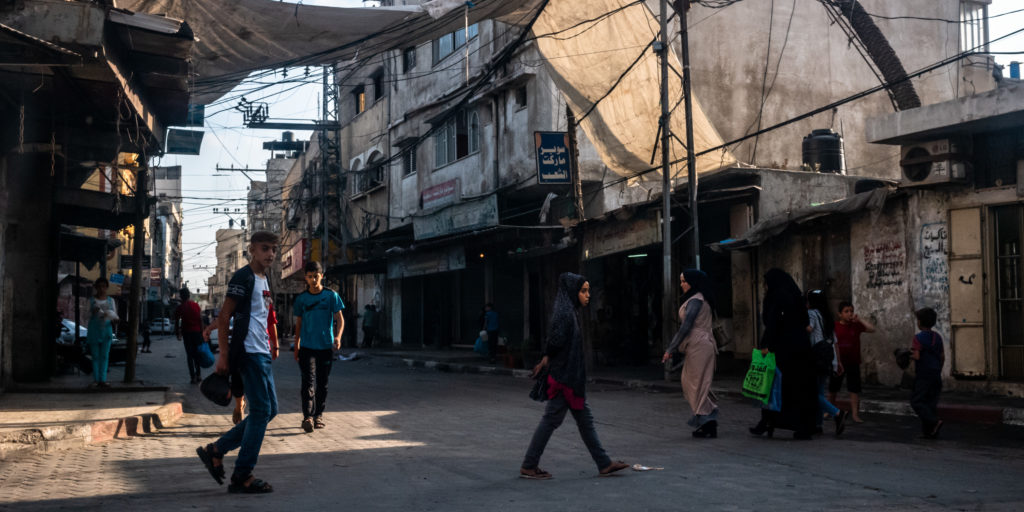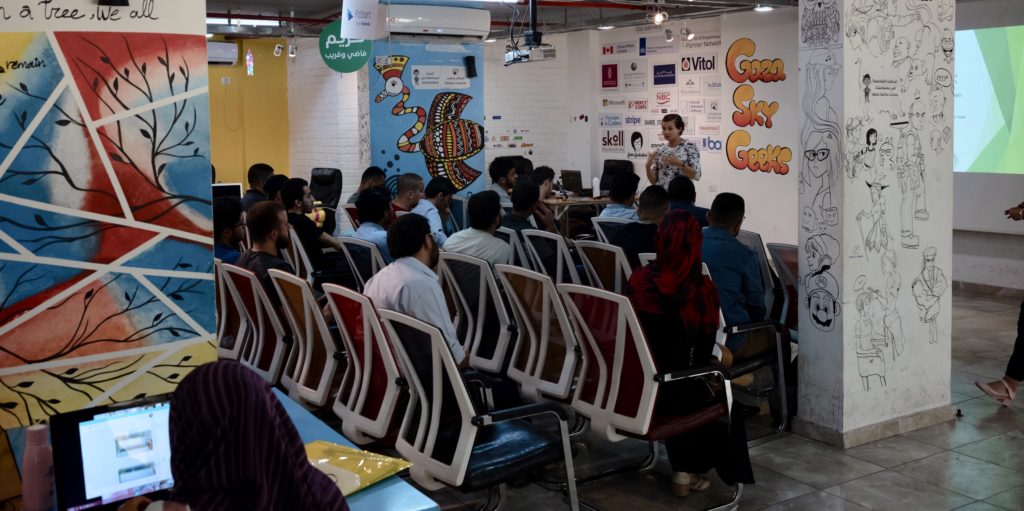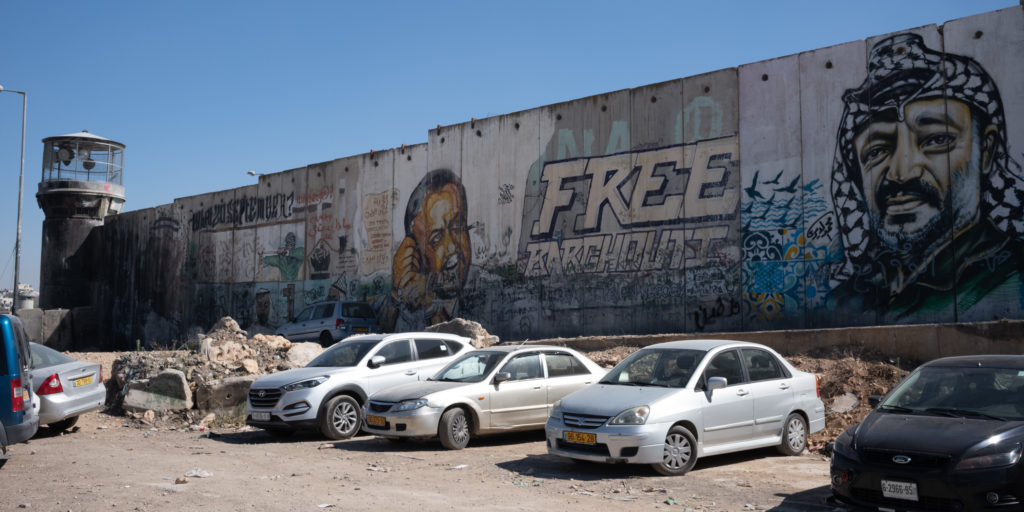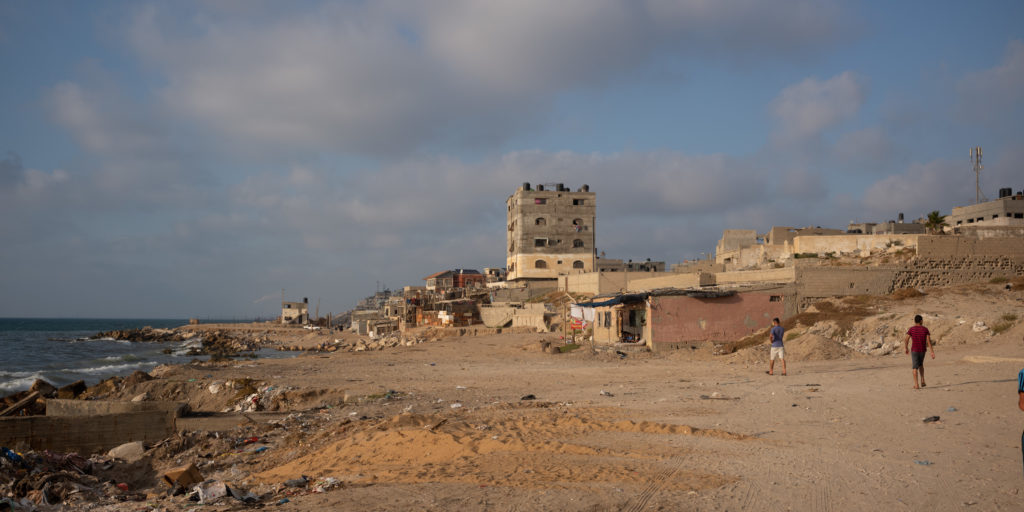“CIDSE will continue to support civil society and community initiatives that promote hope and human dignity in Palestine and in Israel, which have a critically important role, particularly in times of hardship and uncertainty.”
His Beatitude Patriarch Emeritus Michel Sabbah delivered a message of humanity: “Whatever will be the political solution, two states or one state, it should be based on the human reality: All inhabitants in the land called Israel and Palestine, are equal human beings, brothers and sisters in humanity, hence equal in human dignity and in political rights and duties”. He called for an efficient engagement of the international community to adopt “a new vision for a just and lasting peace in the Middle East based on the common good of all who live in this land without distinction, and to start a courageous new phase of action which puts an end to our struggle in the Holy Land“.
H.B. Michel Sabbah was one of the persons the CIDSE Working Group on Israel and the occupied Palestinian territory met during its mission to the region in June 2019. The mission focused on listening to voices on the ground in Gaza and the West Bank and on how civil society is responding in the oPt and Israel.
Die Arbeitsgruppe war der extremen Not ausgesetzt, die die Einwohner von Gaza durch aufeinanderfolgende bewaffnete Konfrontationen und Gewalt, die 12-jährige Blockade und mangelnde Bewegungsfreiheit erlitten hatten. Für die Gazaner wird die Situation immer verzweifelter. Nach den neuesten verfügbaren Zahlen[1]Im Jahr 2018 waren 52 Prozent der Erwerbstätigen arbeitslos. Die Arbeitslosigkeit unter den Jugendlichen im Gazastreifen lag bei über 67 Prozent. 46 Prozent der Bevölkerung in Gaza lebten unter der Armutsquote und 80 Prozent waren hilfsbedürftig. Tausende Palästinenser nehmen weiterhin an den wöchentlichen Demonstrationen des „Großen Marsches der Rückkehr“ entlang des Zauns zwischen Gaza und Israel teil und fordern das Recht palästinensischer Flüchtlinge, in ihre 1948 verlorenen Häuser zurückzukehren. Die vielen Opfer der wiederholten Kriege und während der Großer Marsch der Rückkehr “hat zu einem tiefen Trauma geführt, das fast jede Familie in Gaza betrifft. In diesem Zusammenhang haben immer mehr junge gebildete Gazaner beschlossen, Gaza über Ägypten zu verlassen, was manchmal sehr hohe personelle und finanzielle Kosten verursacht.

Palestinians in the West Bank are confronted with multiple consequences of the ongoing occupation, such as the expanding settlement enterprise, home demolitions and evictions, movement restrictions and settler violence. The Working Group witnessed the increasing feeling of hopelessness of the Palestinian population, in particular, youth and women.
In Israel, discriminatory laws, such as the Nation-State law (for Palestinians in Israel and in the West Bank) and related legislative acts, are aimed at disregarding the rights of Palestinians and other minorities in Israel.[2] We stand with those in support of their call to protect the country’s pluralism.
Palestinians nevertheless continue to show remarkable resilience, courage and creativity in coping with the harsh daily reality and lack of hope. The hardship does not prevent some young people from dreaming that they can turn Gaza, which has a large young educated population, into a thriving area. One such project is Gaza Sky Geeks, a programme of Mercy Corps. Today, Gaza Sky Geeks is the leading co-working space, start-up accelerator, and technology education hub nurturing innovation and entrepreneurship in the Gaza Strip.[3] It brings together young women and men as online freelancers, outsourcers, and start-up founders to share ideas, learn, innovate and code. As Mr. Iyad Altahrawi, Incubation & Acceleration Program Manager said: “While life remains extremely difficult, there are many who are determinedly using technology to work their way around the problems. By looking at the future, Gaza Sky Geeks offers this hope, which is desperately needed in Gaza”.

“We are not Numbers” is a project which was initiated in Gaza after the 2014 war in reaction to media reports only covering numbers and casualties.[4] The project was established to shed light on the tragic reality but also on the daily personal stories of people, by adding the human perspective. At one point, some 200 young writers contributed to the project. Almed Ahnaouq, the project manager said: “Through this platform, authors share and celebrate their stories, with experienced authors mentoring the youth. In times of crisis, it allows writers from various backgrounds to raise awareness and portray a different image of Gaza and its people”.
CIDSE has always underlined the importance of the work of civil society, both in Palestine and in Israel. In a situation of political deadlock, the role of civil society and positive initiatives, such as Gaza Sky Geeks and “We are not Numbers”, are even more crucial. CIDSE will continue to support these important positive projects.
Viele Gesprächspartner der Zivilgesellschaft äußerten sich besorgt über wiederkehrende Angriffe verschiedener Regierungen und in einigen Fällen angeschlossener Lobbygruppen auf ihre Arbeit oder ihr Personal. Die Arbeitsgruppe fordert die Sicherung des kritischen Raums für die Zivilgesellschaft sowohl in Israel als auch auf dem besetzten palästinensischen Gebiet und lehnt nachdrücklich die Bemühungen ab, Kritik zu unterdrücken oder die Redefreiheit der israelischen oder palästinensischen Behörden zu unterdrücken. Die Zivilgesellschaft spielt eine entscheidende Rolle für einen nachhaltigen Frieden.

Die Arbeitsgruppe wird weiterhin eng mit Partnern in Palästina und Israel zusammenarbeiten, um Demokratie, grundlegende Menschenrechte und die Weiterentwicklung pluralistischer Gesellschaften auf der Grundlage gegenseitigen Respekts und gegenseitiger Würde zu unterstützen. Da Palästinenser und Israelis viel zu lange auf die Durchführung von Friedensprozessen gewartet haben, fordert die Arbeitsgruppe nach den Worten von HB Michel Sabbah echte internationale gemeinsame Anstrengungen, um die Parteien bei der Erreichung einer gerechten, gerechten Lösung des völkerrechtlichen Konflikts zu unterstützen und in universellen Normen und Werten. Es geht nicht nur um Frieden und Stabilität in der Region. Es ist die gesamte internationale Rechtsordnung, die in den letzten 70 Jahren entworfen wurde, die bedroht ist. Die internationale Gemeinschaft kann es sich nicht leisten, bereit zu stehen, und muss handeln, um Hoffnung auf einen echten und gerechten Frieden zu geben.
[1] Quelle: Weltbank - Palästinas wirtschaftliches Update vom April 2019 (https://www.worldbank.org/en/country/westbankandgaza/publication/economic-update-april-2019)
[2] Laut Adalahs 18-Briefing vom November 2018 zum jüdischen Nationalstaatsgesetz: „Das Gesetz identifiziert Eretz Israeloder das "Land Israel" als das Gebiet, für das es gilt. Eretz Israel umfasst die gesamte West Bank, einschließlich Ost-Jerusalem. “Das Gesetz wird derzeit vor Gericht angefochten. (Siehe: https://www.adalah.org/uploads/uploads/Final_2_pager_on_the_JNSL_27.11.2018%20.pdf)
[3] Weitere Informationen finden Sie unter https://gazaskygeeks.com/
[4] Weitere Informationen finden Sie unter: https://wearenotnumbers.org/

